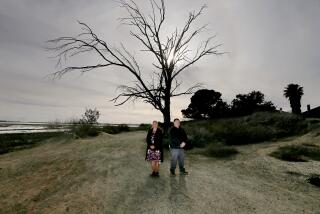Hundreds of Chumash Artifacts Found at Dig
- Share via
An archeological dig that temporarily disrupted the grading for a 34-acre Agoura Hills industrial park was completed Sunday, having turned up hundreds of artifacts from a campsite that apparently was used by Chumash Indians as a hunting base.
Most of the items found by a crew of diggers were arrow points, bowl fragments and hand-held grain milling tools called manos and matates, said supervisor Bob Pence, professor of archeology at Pierce College and a private archeological consultant.
“We found the kind of things you would expect to find in a campsite,” Pence said. “Most of these things are associated with male activity. Not much kitchen stuff. Almost no food remains or garbage. Apparently it was a hunting camp. They may have used it for two or three months a year for 500 years.”
Not of Museum Quality
Pence said he estimated that the camp was established no earlier than the 11th Century.
The materials taken from the site were not of museum quality. They will be cleaned, sorted, catalogued and stored by Archeological Associates of Sun City, Pence said.
The Indian site was discovered last Monday as the large earth movers started to grade a small, round ridge near the center of the $75-million construction project just south of the Ventura Freeway and west of Reyes Adobe Road.
Pence and a representative of the Chumash Indian Nation, who were both hired by the developer to oversee the grading in search of artifacts, found some flakes of chipped rock that appeared to have been made by man.
“We told them we’ve got to dig,” Pence said. “They had to redesign the grading.”
Grading Goes On
Grading continued around the dig. A more serious discovery, such as any sign of permanent habitation or Indian grave sites, could have stopped the project.
But there was none.
As the project resumes today, Pence will continue to monitor the grading on the chance that a grave site might be found.
“It could be anywhere around here,” said Ayapish, the Chumash representative. “There is no way of telling because my people didn’t mark their graves. If we see something here that we don’t want messed with, it won’t happen. We’d stop it.”
More to Read
Sign up for Essential California
The most important California stories and recommendations in your inbox every morning.
You may occasionally receive promotional content from the Los Angeles Times.











